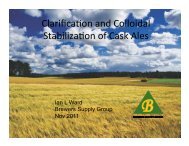Program Book - Master Brewers Association of the Americas
Program Book - Master Brewers Association of the Americas
Program Book - Master Brewers Association of the Americas
Create successful ePaper yourself
Turn your PDF publications into a flip-book with our unique Google optimized e-Paper software.
Technical Session XIV: Premature Yeast Flocculation<br />
Moderator: Barry Axcell, South Africa Breweries Ltd., Sandton,<br />
Republic <strong>of</strong> South Africa<br />
Pr<strong>of</strong>essor Barry Axcell is group chief brewer for SABMiller. He<br />
hold fellowships with <strong>the</strong> Royal Society <strong>of</strong> Chemistry, <strong>the</strong> Institute<br />
<strong>of</strong> Biology, and <strong>the</strong> Institute <strong>of</strong> Brewing & Distilling. He holds<br />
<strong>the</strong> positions <strong>of</strong> pr<strong>of</strong>essor extraordinary in <strong>the</strong> Department <strong>of</strong><br />
Microbiology at <strong>the</strong> University <strong>of</strong> Stellenbosch, honorary pr<strong>of</strong>essor<br />
in <strong>the</strong> Department <strong>of</strong> Molecular and Cell Biology at <strong>the</strong> University <strong>of</strong><br />
<strong>the</strong> Witwatersrand, and special pr<strong>of</strong>essor in <strong>the</strong> School <strong>of</strong> Biosciences<br />
at <strong>the</strong> University <strong>of</strong> Nottingham in <strong>the</strong> United Kingdom. Barry has<br />
authored and coauthored more than 80 papers relating to various<br />
aspects <strong>of</strong> brewing and was <strong>the</strong> first international director <strong>of</strong> <strong>the</strong><br />
ASBC. He has served on <strong>the</strong> ASBC <strong>Program</strong> Committee and Journal<br />
Editorial Board, as well as <strong>the</strong> Technical Committee <strong>of</strong> <strong>the</strong> MBAA.<br />
O-48<br />
The practical hints for brewing from premature yeast<br />
flocculation (PYF)-positive malt<br />
YUICHI NAKAMURA (1)<br />
(1) Nishinomiya R&D Promotion Office, Production Technology<br />
Center, Asahi Breweries, Ltd., Nishinomiya, Japan<br />
Premature yeast flocculation (PYF) is a serious problem in <strong>the</strong><br />
brewing industry. If <strong>the</strong> beer is brewed with PYF-positive malt,<br />
yeast flocculate prematurely during fermentation while high sugar<br />
concentrations remain and lead to a marked reduction in <strong>the</strong><br />
number <strong>of</strong> yeast cells. As a result, a high level <strong>of</strong> vicinal diketones<br />
(VDKs) remains in <strong>the</strong> beer. Many researchers all over <strong>the</strong> world,<br />
including our laboratory, are researching PYF, but <strong>the</strong> cause <strong>of</strong> <strong>the</strong><br />
PYF phenomenon is still unresolved. Therefore, we investigated <strong>the</strong><br />
brewing method for PYF-positive malt, because <strong>the</strong>re is a possibility<br />
that PYF-positive malt is supplied to our breweries. Considering <strong>the</strong><br />
mechanism <strong>of</strong> formation and reduction <strong>of</strong> VDKs with yeast during<br />
fermentation and maturation, we planned two tests: green transfer<br />
(Gruenes Schlauchen) test and high temperature fermentation and<br />
maturation test. These tests were conducted with a 5-kL pilot-plant,<br />
mixture <strong>of</strong> PYF-positive and -negative malt (4:6). We evaluated<br />
<strong>the</strong>se tests based on <strong>the</strong> number <strong>of</strong> yeast cells, <strong>the</strong> value <strong>of</strong> VDKs,<br />
and <strong>the</strong> finished beer tasting. As a result <strong>of</strong> <strong>the</strong> green transfer<br />
test, <strong>the</strong> number <strong>of</strong> yeast cells during maturation increased, <strong>the</strong><br />
value <strong>of</strong> VDKs decreased, and <strong>the</strong> beer taste improved. In <strong>the</strong> high<br />
temperature fermentation and maturation test, yeasts flocculated<br />
during maturation; however, VDKs reached a low value, and<br />
<strong>the</strong> beer flavor improved. These technologies are applied to our<br />
breweries and certainly make it possible for us to brew a better beer<br />
from PYF-positive malt than before, but we have just overcome<br />
<strong>the</strong> first hurdle <strong>of</strong> PYF-positive malt brewing. We still have many<br />
technical difficulties to overcome <strong>the</strong>se PYF problems.<br />
Yuichi Nakamura received a M.S. degree in agricultural chemistry<br />
from <strong>the</strong> University <strong>of</strong> Tokyo, Japan. He began employment with<br />
Asahi Breweries, Ltd. in April 1993. After working as a researcher<br />
in <strong>the</strong> laboratory, he was transferred to <strong>the</strong> brewing section in <strong>the</strong><br />
Ibaraki brewery. He studied at TU Muenchen-Weihenstephan in<br />
Germany for one year from 2001 through 2002 and <strong>the</strong>n returned to<br />
<strong>the</strong> Nagoya brewery. He has been working in <strong>the</strong> Nishinomiya R&D<br />
Promotion Office, Production Technology Center, Asahi Breweries,<br />
Ltd. since October 2005.<br />
O-49<br />
Factors that promote premature yeast flocculation condition<br />
in malt<br />
DAVID GRIGGS (1), Gill Fisher (1), Samantha Walker (1)<br />
(1) BRI, Nutfield, United Kingdom<br />
Flocculation is <strong>the</strong> process whereby yeast aggregate and sediment<br />
from solution at <strong>the</strong> end <strong>of</strong> fermentation. The premature<br />
flocculation <strong>of</strong> yeast during fermentation whilst <strong>the</strong> fermentable<br />
sugar concentration remains high results in a marked reduction<br />
in <strong>the</strong> number <strong>of</strong> yeast cells in suspension, leading to incomplete<br />
fermentations, and can also extend <strong>the</strong> time required for<br />
conditioning and maturation. Although premature yeast flocculation<br />
(PYF) is a sporadic phenomenon, it is an increasingly important<br />
quality issue, and some brewers are setting malt quality targets for<br />
this parameter. PYF is widely considered to be induced in <strong>the</strong> field<br />
when barley is grown under sub-optimal conditions, resulting in <strong>the</strong><br />
formation <strong>of</strong> an antimicrobial agent in response to fungal attack,<br />
but little is known about its subsequent control or remediation.<br />
There is also little knowledge concerning <strong>the</strong> possible influence <strong>of</strong><br />
malting conditions on <strong>the</strong> development <strong>of</strong> <strong>the</strong> PYF condition. The<br />
results <strong>of</strong> research investigating <strong>the</strong> correlation between malting<br />
process parameters and <strong>the</strong> suppression or development <strong>of</strong> <strong>the</strong> PYF<br />
condition in finished malt are presented and discussed.<br />
David Griggs graduated with a honors degree in industrial biology<br />
and worked briefly in <strong>the</strong> plant biotechnology industry before<br />
studying for his Ph.D. degree in plant biochemistry at Long Ashton<br />
Research Station, University <strong>of</strong> Bristol. In 1990 he joined <strong>the</strong> U.K.<br />
malting industry with first Pauls Malt <strong>the</strong>n Greencore Malt, working<br />
in a number <strong>of</strong> technical management roles. In September 2007 he<br />
joined BRI as development director. He is both a diploma maltster<br />
and diploma brewer. He is a past chair <strong>of</strong> <strong>the</strong> IBD Malting Barley<br />
Committee and is a MAGB Malting Diploma examiner.<br />
89



